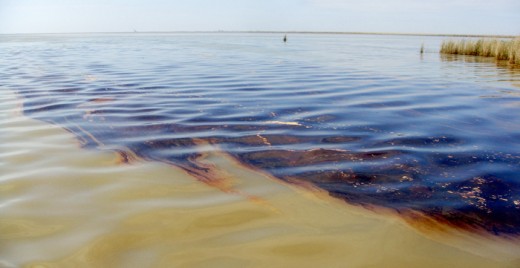Decision In The Gulf

By: Wayne Brown
The oil spill in the Gulf waters has allowed us as good citizens of this country to observe the Obama White House in action. Listening to the talking heads, the various rhetoric being thrown around by “needing to get re-elected” politicians weighed against the backdrop of the potential crush the citizens of Louisiana and, quite possibly, other states will feel before this situation culminates is truly an education within itself. Life is a good teacher and some 37 days in the aftermath of this off-shore blow-out, we are learning that government is by no means a savior and to a large degree no even a decision-maker in this particular situation.
If you want to learn something of the management process, watch these people. They will teach you everything you need to know in terms of what not to do if you expect to achieve good management results. At best, the philosophy at work here is “let’s keep everyone calm while the patient dies.” In doing say, we can say that we were in control of the situation throughout. Let’s face it folks, they missed the mark and the door of opportunity is closing rapidly. Soon, there will be no decisions to be made for the clock will run out on that process. Good decisions are made in a timely manner not when you have all the information but at a point when you have enough information to make an informed decision. This is especially true in emergency situations such as this one.
Decisions can always be made. The timing of those decisions will determine the impact assuming the decision was made on the best information available at the time. That does not mean we wait until we have all the information. It means that we use the information that we have in order to make a decision within the timeframe that will render it productive toward the desired result. When we miss that window, it does no good to stand before people and tout the decision that you can now make after the clock has run out. From my perspective, the government has made it crystal clear that “it is in charge” but in doing so has left the “decision-making process” against a defined timeline in limbo. BP’s hands have been tied in many areas and the states are being held in check on launching any activities they deem necessary to offset the damage. The feds have held the decision-making process close to the vest yet decision are lacking.
Decision-making latitude starts at the top. Delegation of authority, in this case, comes from the President. If he holds all decision-making to his office and does not delegate, then things quickly bog down. One might think that Presidents are highly trained and skilled in this process. Not so. Presidents are just like everyone else attempting to manage. When they feel threatened or feel the stakes are high, they reserve the decision process to their judgment. While this might sound good, look at the results that approached achieved for America when LBJ reserved all decisions regarding the war in Vietnam to his office. In most cases, it will doom the President or any manager to a poor result.
All parties speaking on behalf of the government have their scripted talking points and one can easily tell just by listening to the various interviews that they will forego answering a question or a multiple of questions as long as they stay on script. Obviously there is a strong belief within the administration that delivering this script will offer reassurance to those affected and to a larger extent all Americans who are watching this situation play out. When questions are asked, the replies seem to center on how many pieces of equipment and how many people the government has assigned to this task. When questions are asked as to why the Governor of Louisiana is so upset, the only reply is that “we are working with governor and his people on a daily basis.” There is little or no information that is specific to what is actually being done to support the governor’s needs to save the coastline of Louisiana.
Harry Truman had a quote that sat on his desk which was easily read by anyone entering his office. The quote said, “The Buck Stops Here.” That made it pretty clear as to where he stood I would say. Mr. Obama has missed an excellent opportunity to fulfill the role assigned to him by his constituents by ignoring just that simple little saying. You see, this is what is wrong with the Obama response in this situation. The American public does not need someone standing up everyday to reaffirm that the government is in charge and that the government has its boot heel on the neck of BP and will make sure they deliver. At this point and time in this ridiculous mess, it is long since past the time for Mr. Obama to stand before the American people and give this speech, “The Buck Stops Here. We will continue to see that BP fulfills it role in this process and stays in it to culmination or total bankruptcy, whichever comes first. But, let there be no doubt, this government is here to stand with the people, to make them whole, and to restore their world to a normal state. The Buck Stops Here. No one in Louisiana or any other gulf coastal state needs worry as to whether BP has the adequate resources to see this situation to a successful culmination. Your government is in charge, your government will stand behind the results, and your government will not let you down regardless of what happens to British Petroleum as a result of this unfortunate situation. The Buck Stops Here!”
Then, the President and his advisors can go behind close doors and discuss whatever methods they need to employ to make sure BP and all other responsible parties to this situation stay at the table and work through to completion. At present, there are few people in America who feel with any certainty that BP will be around to see this process through. This situation may well be the end of the line for that company financially. BP knows it and it is on their minds every day as they write more and more checks in their attempts to quell this flow of oil. On that basis, you can bet they will keep any information they deep hurtful to BP close to the vest.
Mr. Obama has no desire to make that speech regarding where the buck stops for fear that he might have to wear it to his next election. Famed Watergate reporter, Bob Woodward observed, “When you see how the President makes political or policy decisions, you see who he is. The essence of the Presidency is decision-making .” Mr. Woodward hit the nail right on the head. Once you consider his statement, it also becomes quite clear that the lack of a decision or the timeliness of a decision plays greatly in the quality of the process. Let’s see, am I going to base my decision on political survival or should I first consider the welfare of those who live along the gulf coast? A President who hesitates to give those alternatives any consideration is not a President for America. Transparency works in many ways and sometimes it is most clear in the decision made or not made by the man who is in charge. Lead, follow, or get the hell out of the way.
Government is proving to America time and time again that it is chocked full of poor managers who cannot manage budgets with any real success. This process starts in our legislative branch and extents outward. We have Congressmen and women and Senators who take great pride in pork-barreling their way back into office year after year and each time they drive the American taxpayer a little further into debt. You see, it’s not their money, it’s ours and few of them seem to care about that fact. The point here is to hear government officials over and over bemoan the fact that the “government is in charge” in this on-going disaster brings little solace to the very people they are attempting to calm. 37 days into this situation, the American public is still waiting for someone to manage this situation that does not have a pony in the race. Good luck.
As the clock ticks on this oil spill, various opportunities are left unanswered while we wait. The governor of Louisiana wants to begin building off-shore silt barriers to at least soften the effect but he is told to wait until it can be studied. Control burns of the surface residue were shrugged off in light of the friction that it might cause in the air quality arena. Admittedly, that does show environmental consideration but one must consider how many volcanic eruptions have been absorbed into the atmosphere of the earth and still we exist. One thing is for sure, the air will be far more capable and forgiving that the marshlands and coastlines.
Doors are closing, oil is spewing, and time is running out for any hope of exercising some reasonable level of control in this situation. The decision point looms both now and in November. One can only wonder if the oil will still be flowing as we head for the voting booths.
© Copyright WBrown2010. All rights reserved








